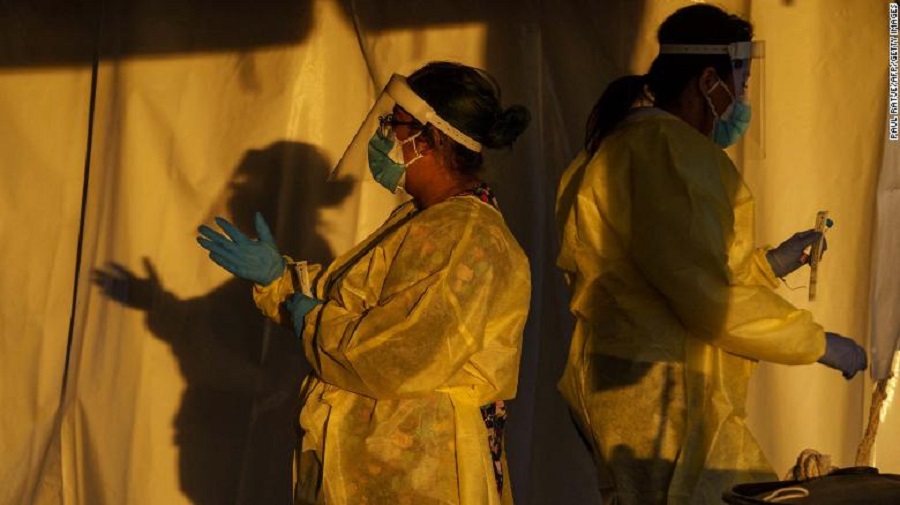
When the Delta variant was dominant in the United States, both vaccination and prior infection helped protect against Covid-19, but vaccination was the safest way to be protected, according to a study published Wednesday by the US Centers for Disease Control and Prevention.
The data included in the study was collected before the Omicron wave in the United States, and before boosters were widely available. The CDC says it will publish additional data on Covid-19 vaccines, boosters and the Omicron variant later this week.
"Although the epidemiology of COVID-19 might change as new variants emerge, vaccination remains the safest strategy for averting future SARS-CoV-2 infections, hospitalizations, long-term sequelae, and death," the researchers wrote.
Researchers analyzed the risk of Covid-19 infection and hospitalization among four groups of individuals: vaccinated with and without prior infection and unvaccinated with and without prior infection. The study case data from about 1.1 million cases in California and New York between the end of May and mid-November 2021. Hospitalization data was available from California only.
Overall, Covid-19 case and hospitalization rates were highest among unvaccinated people who did not have a previous diagnosis.
At first, those with a prior infection had higher case rates than those who were vaccinated with no history of prior infection. As the Delta variant became predominant in the US in later months, this shifted and people who survived a previous infection had lower case rates than those who were vaccinated alone, according to the study.
"Experts first looked at previous infections confirmed with laboratory test by the spring of 2021, when the Alpha variant was predominant across the country. Before the Delta variant, Covid-19 vaccination resulted in better protection against a subsequent infection than surviving a previous infection. When looking at the summer and the fall of 2021, when Delta became the dominant in this country, however, surviving a previous infection now provided greater protection against subsequent infection than vaccination," Dr. Benjamin Silk, lead for CDC's surveillance and analytics on the Epi-Task Force, said on a call with media Wednesday.
However, this shift coincides with a time of waning vaccine immunity in many people. The study did not factor the time from vaccination -- and potential waning immunity -- into the analysis. The study also does not capture the effect booster doses may have and was conducted before the emergence of the Omicron variant.
Throughout the period of the study, risk of Covid-19 hospitalization was significantly higher among unvaccinated people with no previous Covid-19 diagnosis than any other group.
"Together, the totality of the evidence suggests really that both vaccination and having survived Covid each provide protection against subsequent reinfection, infection and hospitalization," said Dr. Eli Rosenberg, New York state deputy director for science. "Having Covid the first time carries with it significant risks, and becoming vaccinated and staying up-to-date with boosters really is the only safe choice for preventing COVID infection and severe disease."
While there's no doubt that prior infection provides some level of protection, vaccination can boost that protection, Dr. William Schaffner, an infectious disease expert at Vanderbilt University Medical Center told CNN.
"If a person who's had natural Covid then gets vaccinated, they have levels of antibody that are much, much higher than after the natural infection itself. And what we know about higher levels of antibody is: one, you usually get a longer duration of protection, and number two, the variety of antibodies that your immune system produces is more diverse. The notion is that you will be better protected against a diversity of variants," said Schaffner, who is a vaccine adviser to the CDC, but was not involved in the study.
Experts noted that characteristics of variants change, including how well they effect immunity from prior infections.
"The data clearly shows that vaccination provides the safest protection against COVID-19 and additional protection for individuals who have had a prior infection. In addition, it shows that people who remain unvaccinated are at the greatest risk of hospitalization and death," said Dr. Erica Pan, state epidemiologist for the California Department of Public Health, said in a statement. "Outside of this study, recent data on the highly contagious Omicron variant shows that getting a booster provides significant additional protection against infection, hospitalization and death."













